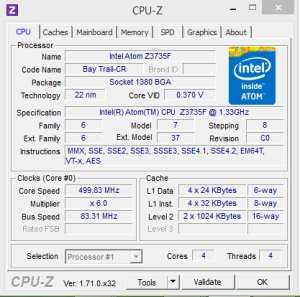CPUID CPU-Z V. 1.71
CPU-Z is a free resource that enables us to get a complete look at the interior components of the Zotac ZBox Pico PI320. Clicking on any picture will provide a much higher resolution.



 SAMSUNG EMMC PERFORMANCE TESTING
SAMSUNG EMMC PERFORMANCE TESTING
Testing the Samsung 32GB eMMC module is a rather unique event as this would be the first opportunity that we have had this in this type of scenario. Initial specifications for this chip listed speeds of 200MB/s read and 50MB/s write.
ATTO Disk Benchmark is perhaps one of the oldest benchmarks going and is definitely the main staple for manufacturer performance specifications. ATTO uses RAW or compressible data and, for our benchmarks, we use a set length of 256mb and test both the read and write performance of various transfer sizes ranging from 0.5 to 8192kb. Manufacturers prefer this method of testing as it deals with raw (compressible) data rather than random (includes incompressible data) which, although more realistic, results in lower performance results.
Read and write speeds of 175MB/s and 109MB/s are definitely encouraging, considering we expected write performance half of that. Also looking at the small file transfer speeds (4.0K), we can identify that these speeds a much lower than that of a typical SSD, that of which reaches as high as the SATA 3 range these days.
CRYSTAL DISK BENCHMARK VER. 3.0 X64
Crystal Disk Benchmark is used to measure read and write performance through sampling of random data which is, for the most part, incompressible. Performance is virtually identical, regardless of data sample so we have included only that using random data samples.
Once again, high sequential performance is encouraging and low 4K performance is much lower than that of which we might see in a typical SSD. We can confirm that, through visible performance that is accounted for by access times, one might find it difficult picking out this system from any other in typical user scenarios.
VALIDATING 64GB MICROSD CARDS
Our last task was ensuring that the Zotac ZBox PI320 was capable of recognizing 64GB SD cards. The micro-SD card that we chose for this purpose was the Samsung Pro 64GB SDXC card.
As we can see, just under 60GB of storage was identified on the Samsung Pro. This is the typical space identified for cards of a 64GB capacity. Take a look at this Zotac video as it covers a bit more of the features that we are seeing:
 The SSD Review The Worlds Dedicated SSD Education and Review Resource |
The SSD Review The Worlds Dedicated SSD Education and Review Resource | 
Thats a pretty fast eMMC !
One would expect much lower speeds, considering the simplistic nature of the device.
One thing i do woder though. Since this is passivly cooled, how low is this throttling under load ?
So wait for this whit core m for 250 eu or 300 laptop whiti 5gen pentium.
Attach a little 5V battery pack to this baby and you have a very portable web server or private hotspot.
Great review! Just want to fix two typos:
1. It should read “2.4Ghz WiFi” instead of “1.4Ghz WiFi”.
2. It should read “Realtek ALC5640” instead of “Realtek ALCS640”.
Would I be able to change the memory chips, to allow for more ram? I’m asking because they are all soldered on.
‘They are all soldered on”